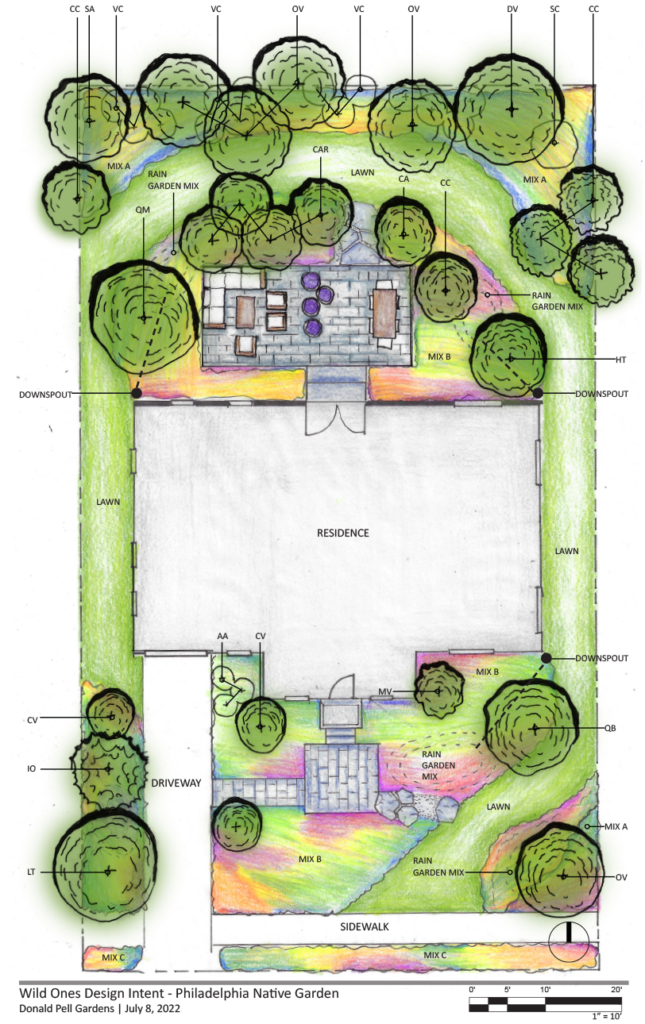
Printing note: This design was created to be 8.5″ x 14″ and the design pdf will print best on legal size paper.
Wild Ones Meet the Designers Webinar
Philadelphia Native Garden Design Discussion with Designer Donald Pell
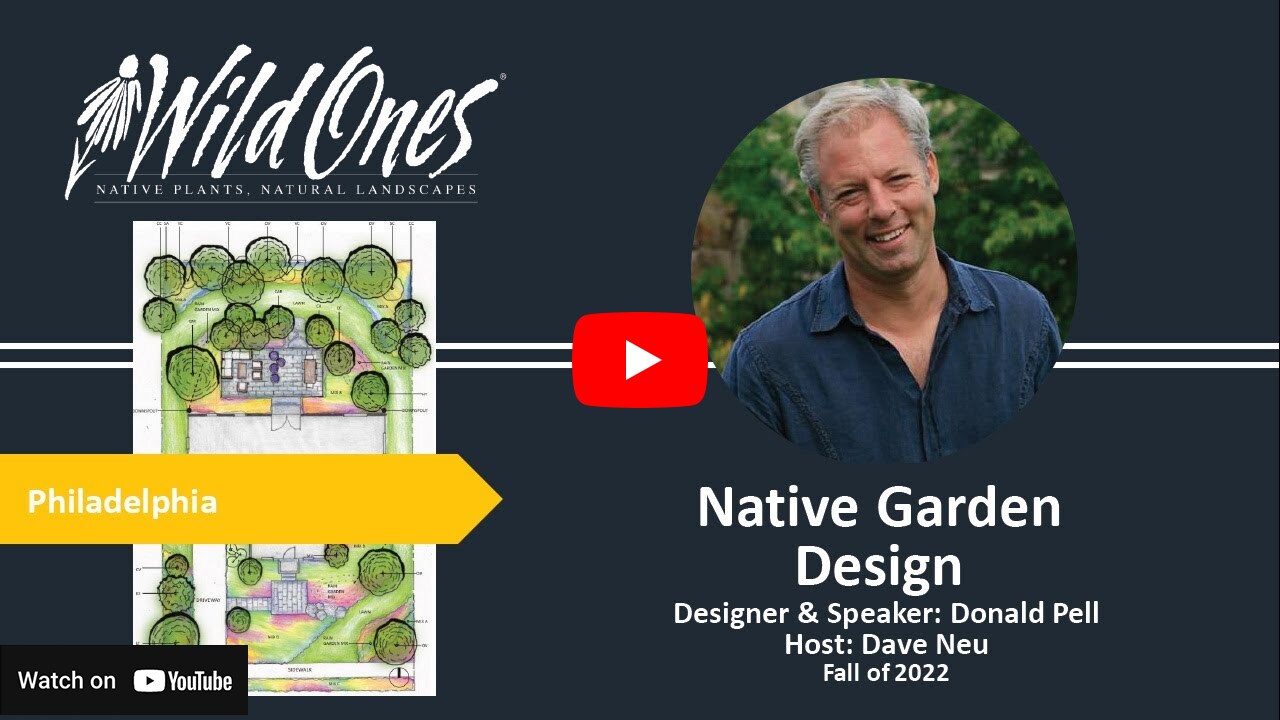
Design Intent
The design intent is to create a resilient garden that responds positively to environmental stress. Plants were chosen for their diverse morphology, cool-and-warm season characteristics, somewhat equally competitive nature and refined character. The gardens are sculpted to create an immersive experience where visitors explore from seating areas or lawn paths and delight in ever-changing perspectives throughout the seasons. Ideally, locally-sourced, natural and sustainable materials are used for the built environment like PA flagstone and local gravel. The garden aids in providing habitat for pollinators, most notably for lepidoptera that, in turn, will become food for birds. Plants like Vaccinium and Sambucas can be harvested for human consumption, while many other plants like Celtis and Aronia provide highly nutritious berries for birds. Dense woody and herbaceous plantings, as well as rain gardens, will help manage rain water.
Planting Specifications
Remove turf grass and fracture soils from 6-24” to less than 200psi. Woody plants should be mulched with a mix of 50% raw wood chips and 50% leaf compost where possible. The herbaceous plants can be installed directly into the prepared soil or any natural mulch at 2” in depth. Gardens should not be mulched annually. The plant specification for Mix A, Mix B and Mix C was selected for well-draining soils with dry to mesic conditions. The Rain Garden Mix was selected for plants that can grow in periods of inundation. A phased approach can be taken by establishing personal priorities. Woody plants should be installed first and herbaceous plants should be planted a maximum of 15” apart in random grouping of 3+ per grouping.
PLANT LIST
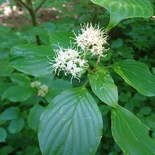
Alternate Leave Dogwood(Cornus alternifolia)
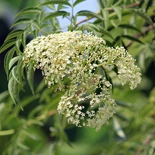
American Elderberry(Sambucus canadensis)
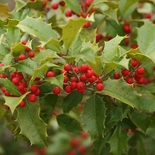
American Holly(Ilex opaca)
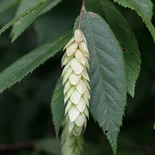
American Hophornbeam(Ostrya virginiana)
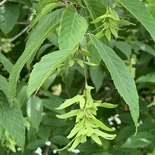
American Hornbeam(Carpinus caroliniana)
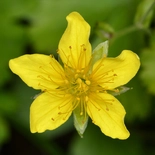
Barren Strawberry(Waldsteinia fragarioides)
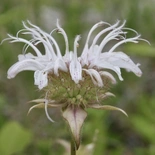
Beebalm(Monarda bradburiana)
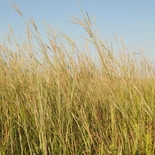
Big Bluestem Grass(Andropogon gerardii)
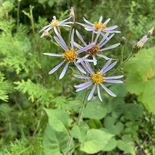
Big Leaved Aster(Aster macrophyllus)
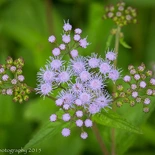
Blue Mistflower(Conoclinium coelestinum)
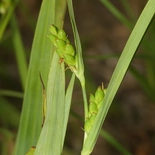
Blue Wood Sedge(Carex flaccosperma)
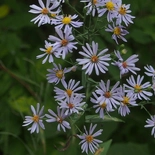
Bluebird Aster(Symphyotrichum laeve)
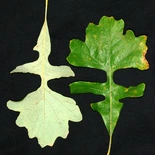
Bur Oak(Quercus macrocarpa)
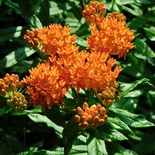
Butterfly Weed(Asclepias tuberosa)
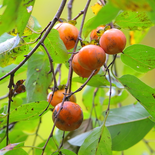
Common Persimmon(Diospyros virginiana)
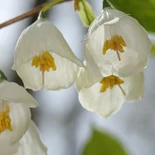
Common Silverbell(Halesia tetraptera)
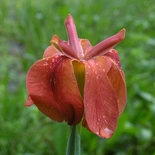
Copper Iris(Iris fulva)
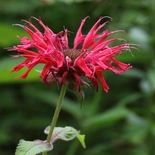
Crimson Beebalm(Monarda didyma)
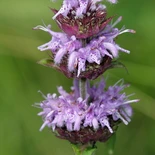
Downy Wood Mint(Blephilia ciliata)
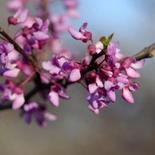
Eastern Redbud(Cercis canadensis)
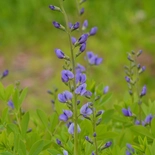
False Indigo(Baptisia australis)
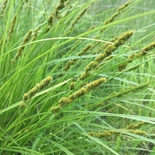
Fox Sedge(Carex vulpinoidea)
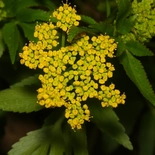
Golden Alexanders(Zizia aurea)
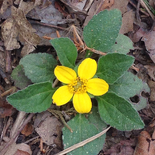
Green and Gold(Chrysogonum virginianum)
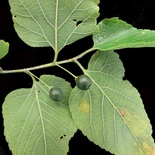
Hackberry(Celtis occidentalis)
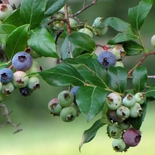
Highbush Blueberry(Vaccinium corymbosum)
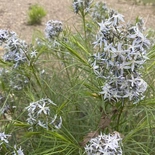
Hubricht's Bluestar(Amsonia hubrichtii)
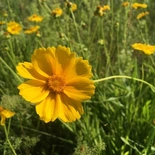
Lanceleaf Tickseed(Coreopsis lanceolata)
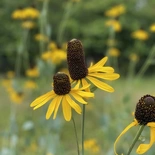
Large Coneflower(Rudbeckia maxima)
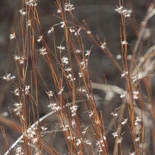
Little Bluestem Grass(Schizachyrium scoparium)
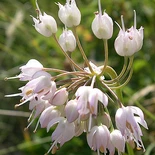
Nodding Onion(Allium cernuum)
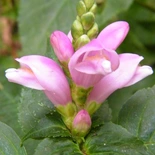
Pink Turtlehead(Chelone lyonii)
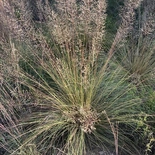
Prairie Dropseed(Sporobolus heterolepis)
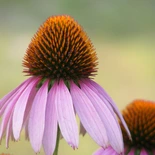
Purple Coneflower(Echinacea purpurea)
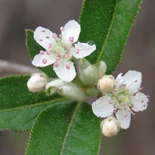
Red Chokeberry(Aronia arbutifolia)
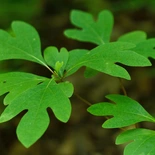
Sassafras(Sassafras albidum)
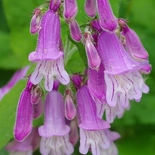
Small's Beard Tongue(Penstemon smallii)
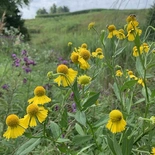
Sneezeweed(Helenium autumnale)
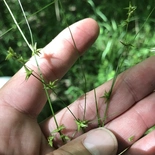
Social Sedge(Carex socialis)
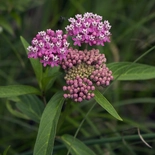
Swamp Milkweed(Asclepias incarnata)
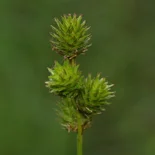
Troublesome Sedge(Carex molesta)
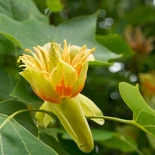
Tulip Tree(Liriodendron tulipifera)
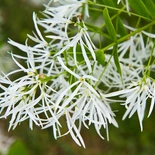
White Fringe Tree(Chionanthus virginicus)
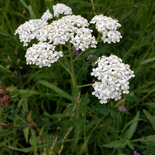
Yarrow(Achillea millefolium)
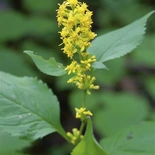
Zigzag Goldenrod(Solidago flexicaulis)
ABOUT THE DESIGNER

Donald Pell, owner of Donald Pell Gardens Landscape Designs in Phoenixville, Pennsylvania has been reshaping landscapes throughout the Eastern United States for over 25 years by juxtaposing what we know with the unexpected, to create an endless wonder of visual possibility. With a focus on adventurous, immersive placemaking, his naturalistic designs magnify beauty through the masterful connections between stunning plants, hardscape and sculptural features.
Donald Pell’s landscapes have won top design awards from the Perennial Plant Association (PPA), the Association of Professional Landscape Designers (APLD) and, most recently, a Silver Medal in his first-ever appearance at the Philadelphia Flower Show. His designs have been finalists in HGTV’s Ultimate Outdoor Awards and featured in several publications, including GROW, Garden Design and Parents Magazine.
Situated on a 14-acre farm in Phoenixville, Pennsylvania, Don’s studio garden has become a frequent destination for New American garden design enthusiasts and horticultural education groups from around the world.
About Wild Ones
Wild Ones (a 501(c)(3) nonprofit organization) is a knowledgeable, hands-on, and supportive community focused on native plants and the ecosystem that depends on them. We provide resources and online learning opportunities with respected experts like Wild Ones Honorary Directors Doug Tallamy, Neil Diboll, and Larry Weaner, publishing an award-winning journal, and awarding Lorrie Otto Seeds for Education Program grants to engage youth in caring for native gardens.
Wild Ones depends on membership dues, donations and gifts from individuals like you to carry out our mission of connecting people and native plants for a healthy planet.
Looking for more native gardening inspiration? Take a peek at what our members are growing!
